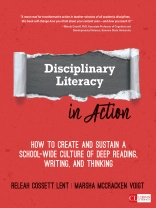‘Much of the professional literature has focused on what disciplinary literacy entails; this valuable contribution explores how it can be implemented in complex school settings.’
—Doug Buehl, Author of Developing Readers in the Academic Disciplines
What happens when middle and high school teachers who know their content very well are told they should be teaching reading and writing too? Is there a bit of resistance? A decrease in self-efficacy? An overturning of curricula? In Disciplinary Literacy in Action, Re Leah Cossett Lent and Marsha Voigt show us a better way.
In this sequel to Re Leah’s bestselling This Is Disciplinary Literacy, the authors provide educators with what they’ve wanted all along: a framework that keeps their subjects at the center and shows them how to pool strengths with colleagues in ongoing communities of professional learning (PL) around content-specific literacy.
In each chapter, and with a blend of lively disciplinary literacy teaching ideas and razor-sharp insights on developing teacher efficacy and leadership, Re Leah and Marsha take educators through a powerful PL cycle they can replicate in their school. The authors know it works not just because the research says so, but also because they have spent years refining the model in schools, districts, and regions. With this book, you will be ready for
- Collaborative learning that preserves discipline-specific content yet keeps innovative daily practices of reading, writing, thinking, and doing at the forefront
- Planning by autonomous literacy leadership teams with administrative support
- Implementation augmented by peer and disciplinary literacy coaching
- Reflection that leads to ongoing collective problem solving
In the end, it all comes back to how content teachers can best help students use literacy in all its forms to learn more deeply. With Disciplinary Literacy in Action, you have a proven framework for doing just that. This is the resource to lean on as you work to ensure all students use literacy as a tool to think, create, and communicate in any endeavor.
สารบัญ
List of Figures
Acknowledgments
About the Authors
INTRODUCTION
What to Expect From This Book
CHAPTER 1: DISCIPLINARY LITERACY AND COLLABORATIVE PROFESSIONAL LEARNING: A PARTNERSHIP THAT WORKS
Literacy Initiatives and PLCs: What Went Wrong?
Collaborative Disciplinary Literacy Learning: A Story of Success
Meet Our Disciplinary Literacy Learning Community
Benefits of Collaborative Disciplinary Literacy Professional Learning
Fostering Disciplinary Literacy Dialogue
Resources for Continued Learning
CHAPTER 2: UNLOCKING DISCIPLINARY LITERACY
What Is Literacy in the 21st Century?
Content Area Literacy Versus Disciplinary Literacy
Disciplinary Literacy Instruction in Action
Fostering Disciplinary Literacy Dialogue
Resources for Continued Learning
HOW TO CREATE A SCHOOL-WIDE CULTURE OF DISCIPLINARY LITERACY
CHAPTER 3: CREATING A SCHOOL-WIDE CULTURE OF DISCIPLINARY READING
Why Read in Every Discipline?
Wide Reading in All Disciplines: There’s No Downside
Reading Strategies: When and How
Vocabulary: The Key to All Content Reading
Fostering Disciplinary Literacy Dialogue
Resources for Continued Learning
CHAPTER 4: CREATING A SCHOOLWIDE CULTURE OF DISCIPLINARY WRITING
Exploring Disciplinary Writing
Writing to Learn in the Discipline Areas
Following the Pros: Disciplinary Mentor Texts
Feedback: From Master to Apprentice
Fostering Disciplinary Literacy Dialogue
Resources for Continued Learning
CHAPTER 5: CREATING A SCHOOL-WIDE CULTURE OF DISCIPLINARY THINKING
Learning to Think in Disciplinary Ways
Curiosity Drives Disciplinary Thinking
Students and Teachers: Thinking Like Insiders Together
Making Disciplinary Thinking Visible
Fostering Disciplinary Literacy Dialogue
Resources for Continued Learning
HOW TO SUSTAIN A SCHOOL-WIDE CULTURE OF DISCIPLINARY LITERACY
CHAPTER 6: BUILDING DISCIPLINARY LITERACY (DL) LEARNING COMMUNITIES
The Problem With PLCs
Fixing the Problem Through DL Learning Communities
Tips for Creating Interdisciplinary
Common Subject Literacy Learning Communities
The All-Important First Meeting
Supporting DL Learning Communities
Moving Toward Collective Efficacy
Sustaining DL Learning Communities
Fostering Disciplinary Literacy Dialogue
Resources for Continued Learning
CHAPTER 7: WHAT MATTERS MOST IN A DISCIPLINARY LITERACY (DL) LEARNING COMMUNITY
Collective Inquiry
Autonomy and Authority
Meaningful Collaboration
Fostering Disciplinary Literacy Dialogue
Resources for Continued Learning
CHAPTER 8: FROM TEACHER LEARNER TO TEACHER LEADER
Disciplinary Literacy Develops Deep Leadership
Disciplinary Literacy Leadership Roles
The Power of Disciplinary Literacy Leadership
Fostering Disciplinary Literacy Dialogue
Resources for Continued Learning
CHAPTER 9: LEADING THE DISCIPLINARY LITERACY CHARGE
Administrative Leaders as Learners
Disciplinary Literacy Coaching: The Glue That Holds It All Together
Fostering Disciplinary Literacy Dialogue
Resources for Continued Learning
Coda
Appendix A: Disciplinary Literacy in English Language Arts
Appendix B: Disciplinary Literacy in Math
Appendix C: Disciplinary Literacy in Science
Appendix D: Disciplinary Literacy in Social Studies
Appendix E: Disciplinary Literacy in Art
Appendix F: Disciplinary Literacy in a World Language
Appendix G: Disciplinary Literacy in Health
Appendix H: Disciplinary Literacy in Music
Appendix I: Technology or Digital Literacy
Appendix J: Disciplinary Literacy in Physical Education
References
Index
เกี่ยวกับผู้แต่ง
Re Leah Cossett Lent is an international consultant known for speaking, writing, and providing workshops on various topics ranging from literacy to leadership teams. She was previously a middle and high school English, Social Studies, and Journalism teacher before becoming a founding member of a state-wide literacy project at the University of Central Florida. There, she contributed to developing Florida′s Reading Endorsement courses and coordinated literacy leadership teams statewide. Her most impactful work stems from multi-day residencies in schools, districts, and consortiums, where she has created numerous professional learning initiatives with positive results in student achievement and teacher leadership. An advocate for student ownership and active learning, Re Leah emphasizes powerful collective efficacy as teacher teams engage in problem solving. She has been recognized with several awards, including intellectual freedom awards from the National Council of Teachers of English and The American Library Association, the PEN First Amendment Award, and the Florida Council of Teachers of English (FCTE) President′s Award for her ‘significant contributions to the teachings of English in State of Florida.’












